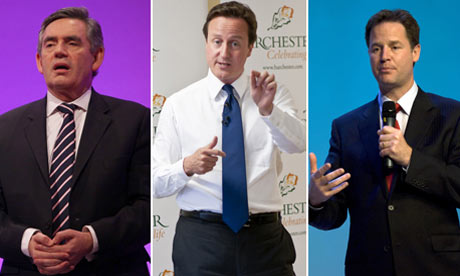 Tue May 11, 2010 3:09pm IST
Tue May 11, 2010 3:09pm IST
By Jodie Ginsberg
(Reuters) – Britain’s third largest party has suddenly found itself in the full glare of the political spotlight. It’s an uncomfortable, and potentially dangerous, place.
An inconclusive election result last week — the first such outcome in more than 30 years — has handed the center-left Liberal Democrats the balance of power.
It should be a moment of triumph for Lib Dem leader Nick Clegg. The Liberal Democrats — formed from the old Liberal Party, one of the two great political parties of the mid-19th century — have not had a shot at government for decades
Now they have a very real chance of ministerial posts and of achieving long-sought reform of Britain’s voting system.
Yet the dilemma of choosing to ally with either centre-left Labour or centre-right Conservatives could thrust the Lib Dems back to the political wilderness for decades if they get it wrong.
"There is a danger that if something doesn’t come out of this that is positive or permanent … then the Liberal Democrats will be skewered," said Steven Fielding, Professor of Political History at the University of Nottingham.
LEADERSHIP TUSSLE
Clegg is in a bind. His party sits on the left of the political spectrum, championing social liberalism, electoral reform and fairer distribution of taxes and services.
That should make an alliance with the ruling Labour party a much more natural fit.
But Labour’s popularity has plunged after 13 years in power and it now faces a four-month leadership battle that could distract it from what all parties agree is the most important challenge for government — tackling the nation’s debts — after Prime Minister Gordon Brown agreed on Monday to step aside.
"How can anyone with any gumption call for stable government and then propose allying with a party which is going to spend the next four months in a bitter leadership contest?" wrote a blogger on activist web site Liberal Democrat Voice.
Nor would the Lib Dems and Labour together have enough seats to form a majority so they would need the support of a clutch of smaller parties, such as the Scottish National Party and Wales’ Plaid Cymru, to push through legislation.
Such a potentially unstable government would test the vision of a strong government Clegg has said the country needs.
"I don’t like what is taking place at all," said former Labour Home Secretary (interior minister) David Blunkett.
"I believe it will lead to a lack of legitimacy and I think that the British people will feel that we have not heard what they have said to us," he told the BBC on Tuesday.
VOTING REFORM
One of the potential trump cards held by Labour was the offer it made before the election of holding a referendum on voting reform, but that was matched late on Monday by a similar offer from the Conservatives.
The Conservatives won the largest number of parliamentary seats in Thursday’s election but fell 20 seats short of a majority. They swiftly offered talks with the Liberal Democrats, including the possibility of working in a formal coalition.
Voting reform is essential for the Lib Dems, particularly if people are turned off by the experience of the country’s first inconclusive election since 1974. Under the current system, which produces a first past the post winner in each parliamentary constituency, they could be squeezed hardest if people try to force a clear-cut outcome at the next election.
"Whoever they go in with, they really have to get electoral reform," said Nottingham University’s Fielding, pointing to the negative experience of the Liberal Party in the 1920s.
Forerunners of the modern Lib Dems, the Liberal Party put a minority government into power twice in the 1920s.
In 1923, the Liberals supported the second-largest Labour party rather than the bigger Conservatives but the resulting Labour minorituy government lasted just 10 months and the Conservatives were then elected with a majority.
The Liberals also supported Labour — this time the largest party, although again short of a majority — in 1929 after Labour promised a commission on electoral reform.
"Unfortunately for the Liberals by the time Labour left office in 1931, amidst a grave financial crisis, it had failed to pass any legislation," Fielding said.
The Liberal party then split over joining a national government to deal with the financial crisis and the party was an almost spent force for the next 30 years.
LONDON (Reuters) – Britain’s third largest party has suddenly found itself in the full glare of the political spotlight. It’s an uncomfortable, and potentially dangerous, place.
An inconclusive election result last week — the first such outcome in more than 30 years — has handed the centre-left Liberal Democrats the balance of power.
It should be a moment of triumph for Lib Dem leader Nick Clegg. The Liberal Democrats — formed from the old Liberal Party, one of the two great political parties of the mid-19th century — have not had a shot at government for decades.






























